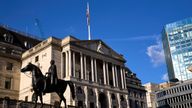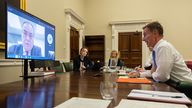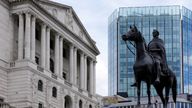Bank of England economist criticises government interaction with ‘other institutions’
The chief economist at the Bank of England has criticised the lack of cooperation between Liz Truss’s government and state economic institutions.
Huw Pill said that the country would have benefitted from increased cooperation among institutions.
Speaking at the Office of National Statistics (ONS) conference on understanding the cost of living through statistics, Mr Pill said: “In my view, we might have benefited in recent weeks if the interactions amongst other institutions had followed that pattern.”
He had praise for the cooperation between official statisticians at the ONS and the Bank of England.
“That’s a model for how macro policymakers in the UK should respect the institutional framework when they interact with one another,” he said.
The Truss government had announced a mini-budget of unfunded tax cuts along with billions of pounds in spending on the energy price guarantee without consulting the Office of Budget Responsibility (OBR).
The independent office is consulted before budget announcements and provides economic forecasts that are used by bodies including the Bank of England.
The Bank had confirmed it was not notified of the content of the mini-budget announcement before it was presented to parliament on 23 September.
The announcement coupled with the lack of OBR consultation caused financial turmoil.
In the wake of the mini-budget, the pound sank to a record low against the dollar, resulting in increased costs for those importing goods.
Mortgage rates rose on the back of the financial uncertainty and concern the Bank of England would further increase interest rates to rein in inflation to its targeted 2% rate.
The cost of government borrowing also rose steeply and the Bank had to launch an emergency intervention to prevent a collapse in the pensions industry.
Mr Pill has become an unlikely critic of the government in the weeks following former chancellor Kwasi Kwarteng‘s mini-budget announcement.
He rebuked the government’s claims that the economic fallout was due to global factors, such as the war in Ukraine, by stating that there was “undoubtedly a UK-specific component” to the market reaction.
The Bank and the government were effectively placed on a collision course as Ms Truss and her chancellor sought to ramp up growth with its tax slashing plan and the Bank attempted to depress growth through higher interest rates.
The vast majority of mini-budget measures were axed by the Chancellor Jeremy Hunt following the sacking of Mr Kwarteng.


